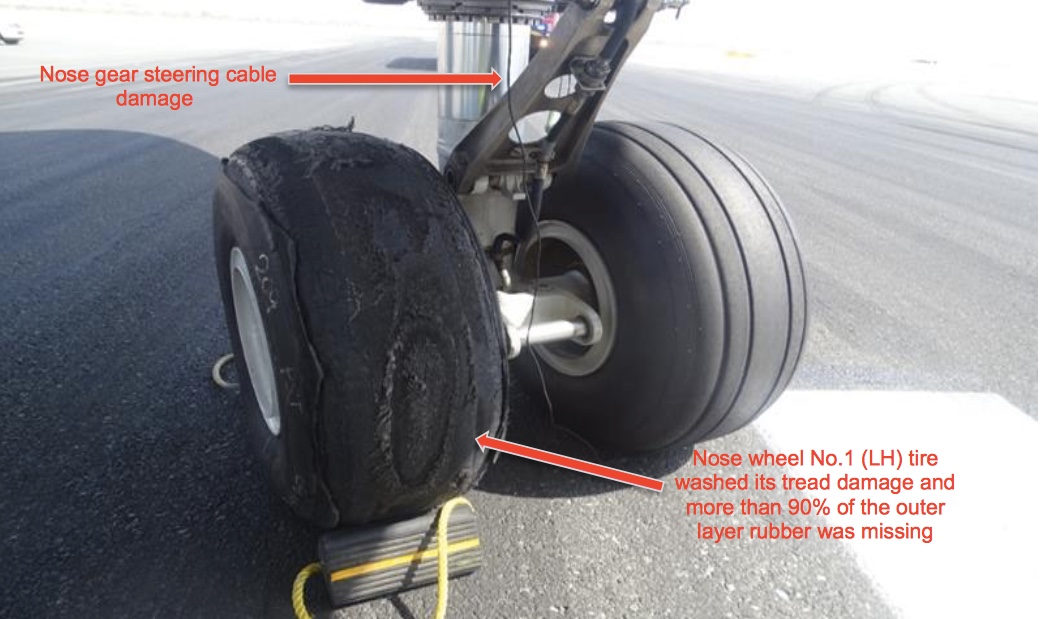
A former Etihad Airways pilot has spoken to The Australian about difficulties he had in securing psychological treatment from the airline after raising concerns about his own mental health. The claims raise further concerns about how Persian Gulf airlines treat staff members in safety critical roles who suffer from mental health issues. Finian Greene, a 50-year old First Officer from Australia claimed Etihad has a “blase attitude” towards mental health.
Mr Greene realised he had a problem after a serious incident in September 2016 when an Etihad Airways plane that he was co-piloting was forced to make an emergency landing when the number one engine was struck by debris and seriously damaged. The Boeing 777-300 with 352 passengers and crew on board landed heavy and took up nearly the entire runway to safely come to a stop.
Etihad Airways flight EY450 was departing Abu Dhabi International Airport bound for Sydney and had commenced its rotation during the takeoff roll when a loud bang was heard in the cockpit and the number one engine failed. The front landing gear tyre had been shredded by sharp foreign object debris (FOD) on the runway, sending tyre tread into the number one engine.

“Witnesses heard a loud bang and saw a large fireball as the engine destroyed itself basically,” explained Greene in comments made to The Australian.
“But we had to continue because we were beynd a speed that would allow us to safely stop… We got the aircraft back and did an overweight landing; a very fast, single-engine landing we used up the whole of the runway.”
In fact, the plane had just 230 metres of runway left when it came to a complete stop – it had used 2,590 metres of runway to get to this point.
A subsequent investigation found that tyre tread had also been sent flying towards the number two engine but had struck and bounced off the cowling (the engine cover). If the tread had been ingested into the number two engine, what was already a serious incident could have had a very different ending.

“We were very lucky it didn’t go through that engine as well or it would’ve been a very different story for the 352 people onboard,” Greene muses.
After five days off, Mr Greene was rostered back into flying duties. At this point, he realised that something wasn’t right in himself. He says he felt that he was “deeply in trouble” and decided to return to his family in Australia. During this time Mr Greene contacted Etihad’s vice president of medical services.
Unfortunately, despite assurances that Mr Greene would be given help before returning to flying duties, he found himself back in Abu Dhabi with no appointments scheduled and flying duties rostered. “Towards the end I was just begging, saying ‘I cannot fly'”, he says of his treatment.
Eventually, Mr Greene decided that it was unsafe for him to continue flying and returned to Australia to seek specialist treatment for PTSD. Etihad didn’t get in contact but dismissed him and revoked his entitlements despite the fact that he had worked for the airline for over 10-years.
One has to wonder whether Etihad could have done more after a pilot suffered such a traumatic experience? Mental ill-health is a fact of life – it can affect anyone and with the right treatment, Mr Greene may well have been able to return to flying. At the very least, Etihad could have acknowledged his concerns and not rostered him flying duties when he was trying to tell the airline that he didn’t feel that would be safe.
Of course, this isn’t the first time that mental ill health has been the subject of much discussion at Middle Eastern airlines. In March 2018, a member of Emirates cabin crew jumped to her death from the open door of a parked Boeing 777 in what was an apparent suicide. Earlier this year, another member of Emirates cabin crew jumped from a balcony at the airline’s head office in Dubai in what appeared to be a mental health crisis.
In other cases, cabin crew with controlled depression have been denied the right to join Emirates and Etihad – or even dismissed. It raises the prospect of people lying about what are otherwise perfectly treatable conditions and in turn creating a dangerous situation that doesn’t need to exist.
Of course, some mental health conditions aren’t permitted in safety critical roles like cabin and flight crew. This has caused the subject to become a taboo across the aviation industry – an issue that some airlines are desperately trying to change.
In this case, Etihad has declined to make a comment.
Investigators concluded that the accident had been caused by a sharp piece of metal that found itself on the runway. At the time, Abu Dhabi International Airport did not have an automated FOD detection system. Measures have since been implemented since the accident.
Mateusz Maszczynski honed his skills as an international flight attendant at the most prominent airline in the Middle East and has been flying throughout the COVID-19 pandemic for a well-known European airline. Matt is passionate about the aviation industry and has become an expert in passenger experience and human-centric stories. Always keeping an ear close to the ground, Matt's industry insights, analysis and news coverage is frequently relied upon by some of the biggest names in journalism.









